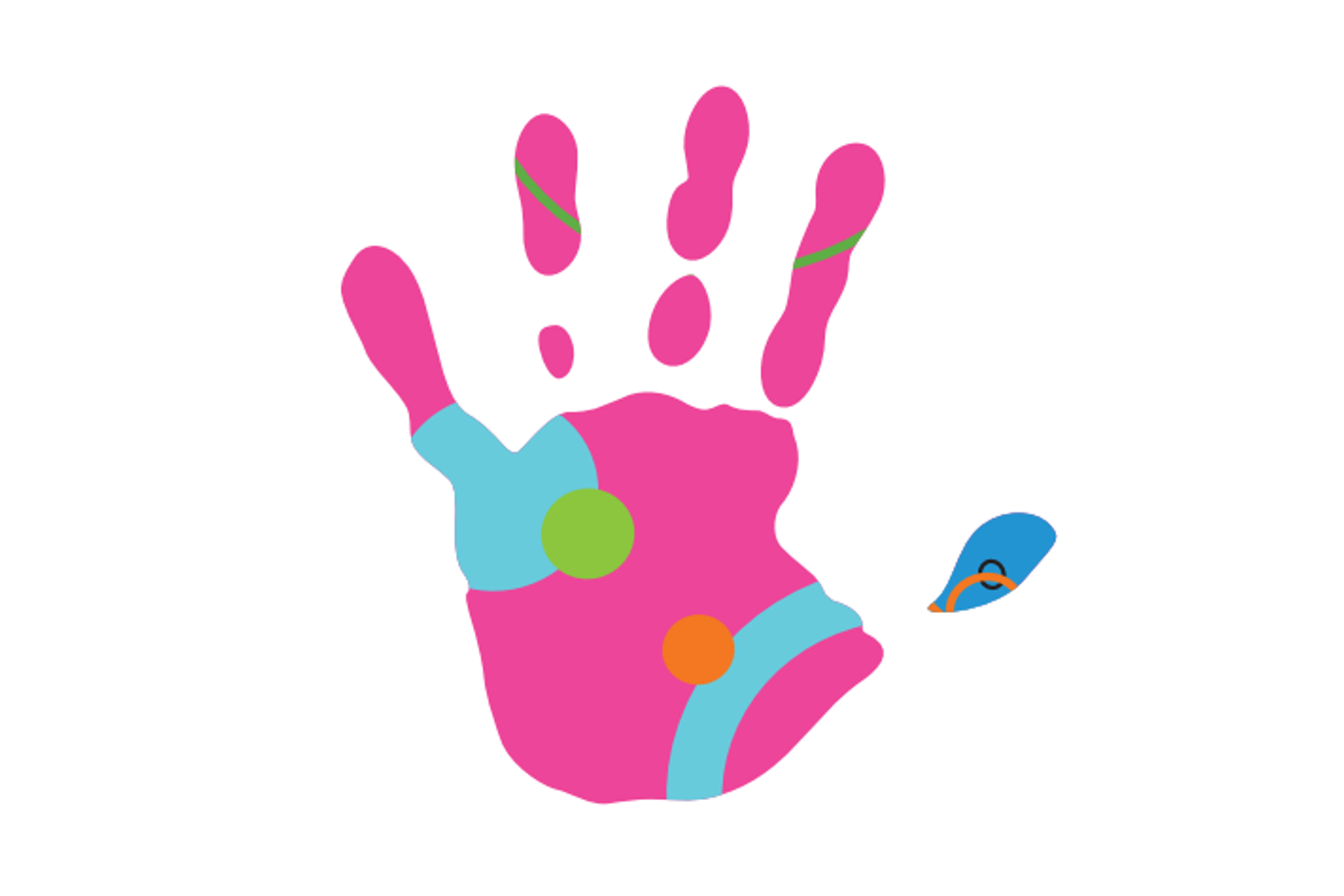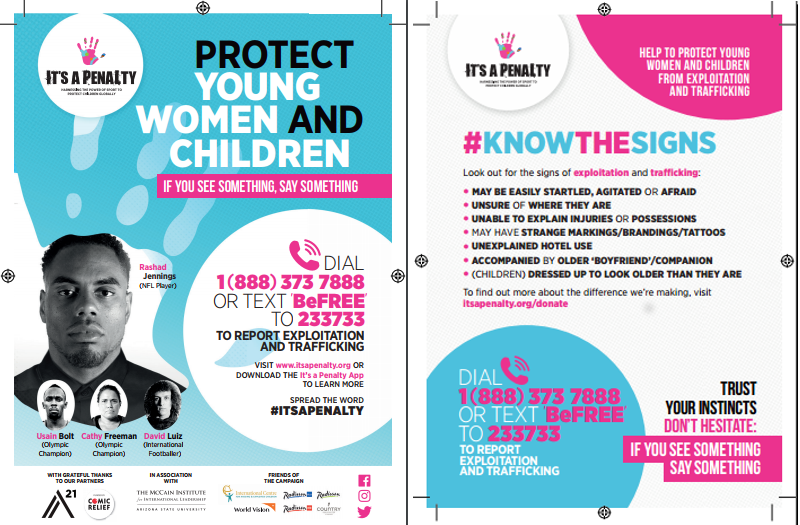
Q&A: Sarah de Carvalho (CEO – It’s A Penalty)
With the 2018 It’s A Penalty campaign to tackle child abuse and exploitation due to kick off at next month’s Super Bowl in Minneapolis, Gridiron caught up with the organisation’s driving force, CEO Sarah de Carvalho, to learn more…
Q:
Give us a little of the background to It’s A Penalty and explain what the campaign hopes to achieve?
SdC:
It’s A Penalty is a global campaign which we run during major sporting events because we believe that sport, and these events, can provide a platform for a positive social change, with the objective of preventing the abuse, exploitation and trafficking of children and young girls worldwide, which is a major issue online and offline.
Each year, over two million children are exploited into the global sex trade, 1.2 million are involved in human trafficking – almost 20% of trafficking victims are children and some 40 million children worldwide experience some form of abuse. On top of that, 63% of child sex trafficking survivors were advertised online at some point during their trafficking situation.
The first It’s a Penalty campaign was launched ahead of the 2014 World Cup in Brazil, to prevent the exploitation and abuse of children on the ground in Brazil. The huge success of this activity then led to It’s a Penalty working with the IOC and introducing an even more extensive campaign around the 2016 Rio Olympics and Paralympics.
Our 2018 campaign itself focuses on communicating to sports fans, tourists, athletes and local residents, both online and offline, to do three things: Firstly, educate them about the issue because many people aren’t aware of the issue; secondly, to equip them with mechanisms to identify and report a crime because, often, people want to participate but don’t know the signs to look out for; and, finally, to encourage them to report anything suspicious – ‘see something, say something’
Q:
The 2018 campaign takes in four major international sporting events, including the Winter Olympics, Commonwealth Games and the Hong Kong Rugby Sevens, but kicks off with Super Bowl LII in Minneapolis next month… was there any particular reason for targeting that city?
SdC:
In Minneapolis, research shows, from recent figures, that, in 2015, there were 36 boys and 943 girls who were victims of sex trafficking, so I suppose what we’re saying is let’s all come together and protect those young girls and boys during the Super Bowl. But it also raises awareness that it is a global issue, which is why we’re running this campaign during three other major sporting events this year.
Q:
Minneapolis aside, what benefits are there to using the Super Bowl as a platform for It’s A Penalty?
SdC:
I think two things… First of all, this is a global problem – it’s not one country’s problem or one city’s problem – because we’re all online, so it’s not just America. Also, the Super Bowl have set up a sub-committee just to deal with [the issue], so there is an anti-trafficking sub-committee in Minneapolis and we’re working with them because the city is aware that they do have an issue. The Super Bowl is a major global sporting event, there is an issue in the United States and in Minneapolis, and we know that, wherever there is an influx of hundreds and thousands of people to any given city, children and young people already at risk are even more vulnerable.
Sport has a tremendous power to unite and break cultural barriers, and major sporting events allow a spotlight to be shone on the issues. There will always be unscrupulous people that will exploit these young people to make money. They often dress them up to make them look older than they are, so it’s just making people aware that, yes, this is an international problem, but it’s also an issue in the city that you’re going to be visiting, so please join us because, together, we can make a difference. I think, just by the response that we’ve had from the actual athletes themselves, as well as the sporting governing bodies and law enforcement agencies, that we’re all aware it is a problem.
Trafficking, by its free nature, is a hidden issue, but we’ve worked with the Super Bowl anti-trafficking sub-committee and 14 hotels in Minneapolis so that everyone who stays in those hotels will receive leaflets detailing signs of exploitation, and a wristband with a hotline number – the Polaris hotline – that they can call if they see anything. Then there’s the film that’s going on the airlines and a 47-second version that will be shown in [hotel] lobbies and on giant screens running up to the Super Bowl and during the event itself. Hopefully, next year in Atlanta, it will be shown in the stadium itself because, evidently, it is a very big issue there too. I feel that this [year] is opening a door and the Super Bowl anti-trafficking sub-committee will endorse us to Atlanta.
Q:
Tell us a little more about the ‘app and map’ that accompanies this year’s campaign…
SdC
We’re going to be launching an app at the end of January which people can download, and we’ve developed this map of the world so that, wherever you are, it will come up with mechanisms so that you can report a crime against a child or young person, both online or offline.
We want people to be aware of the issue and aware of what’s going on in the city where you’re going to be and how you can make a difference by making that call if you spot something. But also, by downloading the app, wherever you are in the world, you can make a difference by reporting it because, of course, there is a lot of online activity and people will be targeted online when they fly into these major sporting events.
Q:
How important is it to have some of the big name supporters you have behind It’s A Penalty – the likes of former NFL star Rashad Jennings, as well as the likes of Usain Bolt, David Luiz and Gary Lineker?
SdC:
They are the voice of the campaign and we’ve got a fantastic group of sporting men and women from different countries, sport and sporting events speaking out on behalf of these children – and they’re doing it because they feel passionate about it. I think, more and more, that we’re becoming aware, in the news, that sporting clubs are not exempt from child abuse issues and we’re aware that, at major sporting events, the issue increases, so they feel passionate about it. It’s amazing that we’ve got Usain Bolt for the second campaign running, and Cathy Freeman as a voice for Australia; that we’ve got Paralympians for the first time, which is really important… For me, they are the voice of the campaign, definitely.
Q:
So what should people look out for at the Super Bowl?
SdC:
It’s just being aware that, in that city, statistics show that there are over a thousand people in Minneapolis, in Minnesota, that have been vulnerable to sex trafficking – but that they can help. Some of the signs to look out for – and this has been designed in conjunction with the Super Bowl sub-committe – include young people being unusually agitated, startled or afraid; unsure of where they are; unable to explain injuries or possessions or having strange markings or tattoos. There may be unexplained hotel use; they may be accompanied by a much older ‘boyfriend’ or companion; or clearly dressed up to look much older than they are
People should be aware that, while it is a global issue, it is also an issue where they are travelling to. Just to give you an idea, when we ran the campaign during the World Cup and Olympics [in Brazil], there were 16,303 victims that it helped. Every single call is a ‘victim’ protected and rescued, so we can help to protect those children and young people by looking out for the signs, calling or texting the Polaris number (1-888-3737888 or text BEFREE to 233733) to report any exploitation or trafficking.
Q:
As well as attempting to educate the public on the signs and what they can do, you’re also trying to underline just how severe the penalties are for those who might get caught…
SdC:
I want to point out that we’re not accusing anyone of being an offender, which is why we’re educating people on what to look out for and encouraging them to ‘if you see something, say something’, but we’re also making people aware [of the other side of things] because we don’t want them to inadvertently find themselves on the wrong side of the law. It should be a deterrent to know that offenders will be prosecuted either in country [where the offence takes place] or when they get back home thanks to the extra-territorial legislation, the provision in law for countries to prosecute citizens for the abuse of children if it takes place abroad. America has it and so does the UK….

